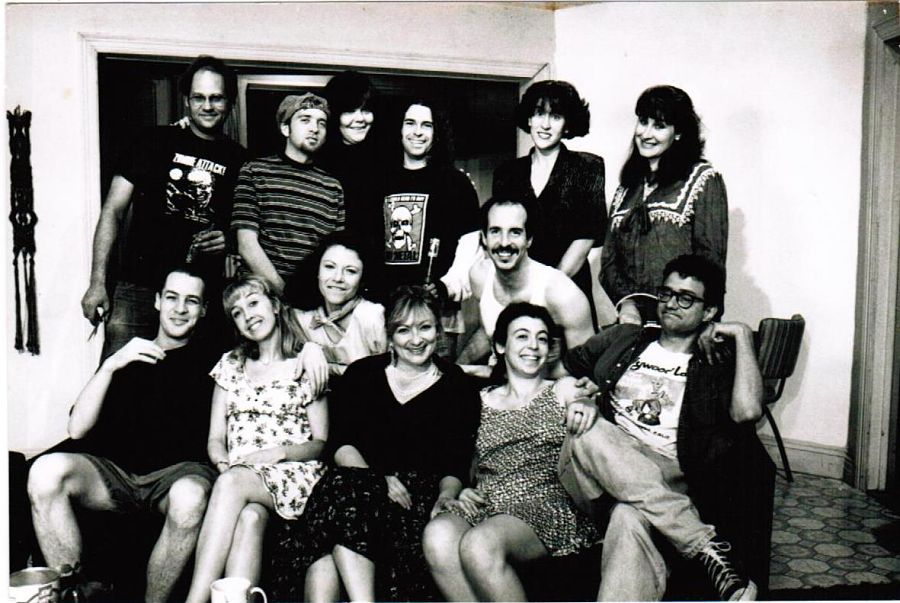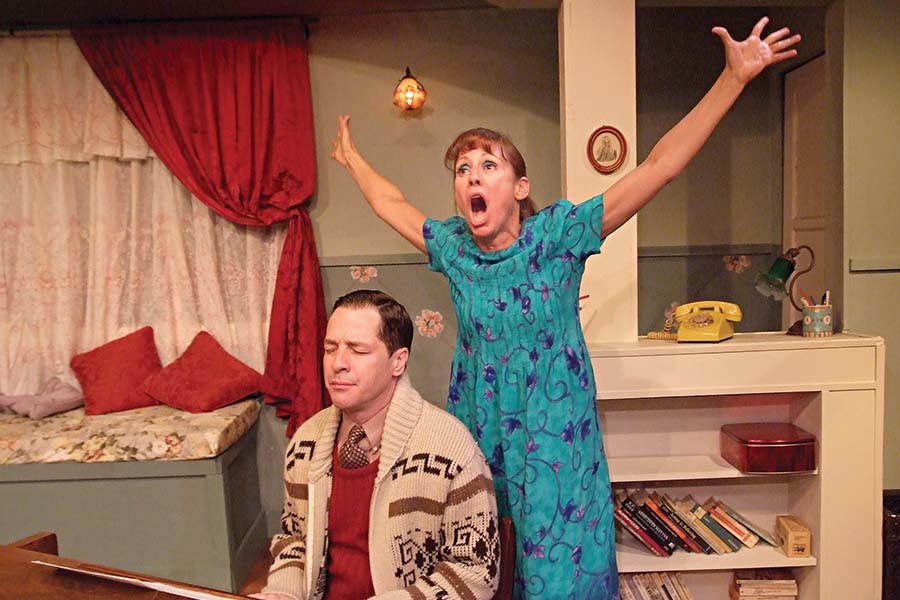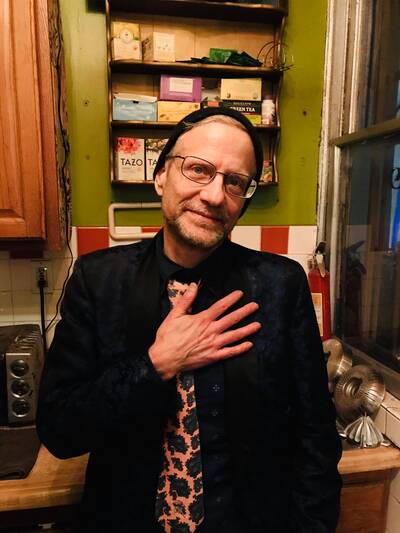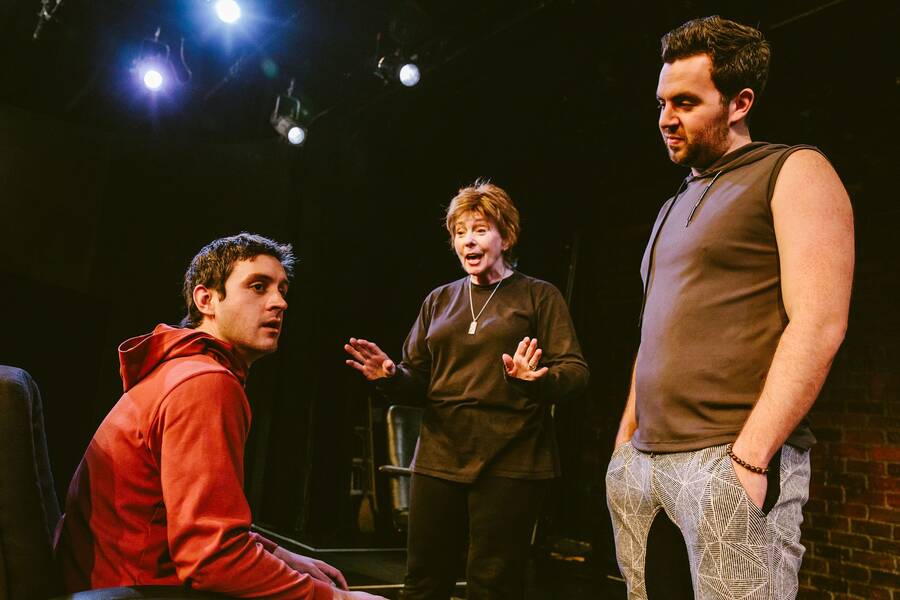Theatre is, among other things, a social activity, and when we think of the plays we’ve loved or companies we’ve followed, I’d wager none of us recall only the transporting traffic of the stage. We also think of the bar next door where we had a knockdown argument or a passing flirt, the lobby where we ran into an old friend, the parking garage where our car got keyed.
In my case, I remember with special fondness the modest beer garden—really, just an outdoor concession stand with a thatched covering, Christmas lights, and a bench to sit and smoke on—next to the Cast Theatre on El Centro Avenue in Hollywood, where I spent many an hour before, after, and between seeing shows by the theatre’s resident Bard throughout much of the 1990s, Justin Tanner. I’ve written before about the unique magic of Tanner’s slacker comedies and the indelible oddball ensemble they employed, and how, apart from the many joys of the work itself, in the aggregate these productions taught me to embrace the bittersweet ephemerality of theatre, and schooled me in my small role in the bargain, which ultimately amounts to my saying, “This happened here and I saw it.”
From that garden, in fact, I could sometimes catch a glimpse into the Cast Theatre’s offices, the secret den where artistic director Diana Gibson held court, along with managing director and resident set designer Andy Daley and the shy, bespectacled Tanner himself, who didn’t just write and direct the plays—long-running hits like Pot Mom and Zombie Attack!, as well as Bitter Women, Teen Girl, Happytime Xmas, and Heartbreak Help—but also seemed to live at the theatre, like some unholy combo of auteur and dogsbody. Among the things I took for granted about that remarkable theatre and its output was this odd arrangement: What other theatre in Los Angeles, let alone the U.S., produced the work of a single playwright? Not even theatres with Shakespeare in their name exclusively do Shakespeare. I did sometimes hear grumbling from other local playwrights, for whom the Cast had once been a place they could submit their work, at its becoming the de facto Justin Tanner Playhouse. But as a theatregoer and critic, I only saw upside.
It wasn’t until Steven Mikulan wrote an LA Weekly cover story, “The Prisoner of El Centro Avenue,” that some of the backstage drama behind this creative hothouse got a public airing. The picture that emerged was of a dysfunctional mother-son relationship, with Gibson as the taskmaster parent and Tanner the needy boy genius. There was a financial entanglement to the story—Tanner had accepted a job writing for Universal TV, but under the strange condition that he would continue to work out of the decrepit offices of the Cast, and that Gibson would be paid as well, with the idea that she was crucial to his writing process. But the main thrust of Mikulan’s story, as its title indicated, was that Tanner felt both indebted to and trapped by Gibson’s influence, and was finding it increasingly difficult to write anything that would fit her exacting standards.

A lot has happened since those halcyon days: a coup that saw Tanner and Daley take over the theatre from Gibson, only to have it close a year later; a period when Tanner wrote a late-night sketch serial called The Strip at the Evidence Room (for which, full disclosure, I served as music director); a soap parody on YouTube, Avenue 43; Gibson’s death in 2014; and a series of new Tanner plays (Voice Lessons, Procreation, Day Drinkers, Space Therapy, El Niño) as well as revivals of his older works (Teen Girl with Zoe Perry).
Now Tanner has returned with a show he had in him all these years. Little Theatre, opening tonight at the Matrix Theatre, in a Rogue Machine Theatre production through Jan. 8, 2023, is an only very slightly fictionalized roman à clef about both his debt to Diana Gibson and the strange forms of psychological torture she put him and his colleagues through as he found his playwriting voice, as much in spite of as because of her. Perhaps unsurprisingly for a playwright who has always written juicy, complicated parts for women, Monica Menlo—the name he gives the Gibson character, played by Jenny O’Hara—emerges as a signature Tanner creation, an avatar of need, pique, and pain as hilarious as she can be horrifying. Monica is the kind of fabulous monster who’s nearly impossible to be around, yet still drops pearls you’re grateful to catch, like the time she refers to the theatre’s board as a “cabal of septic trolls” or the time she stops an angry young playwright who’s telling her off, “Remember this feeling; use it in a play. It’s gold.”
At a time when the theatre field is reconsidering the relationship of art-making to abuse, of trauma to drama, Little Theatre is play that reckons with the painful realization that, as James Baldwin once put it, for a writer “the things which hurt him and the things which helped him cannot be divorced from each other.”
I spoke to Tanner via Zoom last week.
ROB WEINERT-KENDT: I read an early draft of Little Theatre, and then the new one, and they’re a bit different, though the overall thrust is the same. Can you talk about how the play developed?
JUSTIN TANNER: When I wrote the first version, I was still using drugs and drinking, and I had been reading a lot of postmodern literature; I was really into this Australian writer named Patrick White, whose writing style is, you’re in the present, then it will be in the past and things are happening. So I decided that for that first version, I was going to make it cinematic, to have it be dreamlike. And then two things happened: I got sober, and then, back in September, we did a reading for all the designers and the actors, and everyone kind of admitted they didn’t understand the play. Everyone just said, “We don’t get it.” So I just gave in. The thing that I dread most of all is direct-address narration—I’ve always really disliked that in plays, and I’ve never done it in my own plays. But Lisa James, the director, suggested I might try it as glue to hold pieces together, and it seems to work.
The events of the play happened a quarter century ago. Why revisit them now? Or, to ask that another way, why did it take so long for this play to emerge?
Well, Matt Shakman had purchased the old Cast Theatre and they were going to open it up. I met with him. Diana was still alive at the time, and they said, “Would you write a play to inaugurate it?” I pitched them this play, and at the lunch meeting, Matt said, “I think that sounds a little litigious”—like, they were afraid they couldn’t do it, because Diana was alive. I think they were absolutely right, but at that lunch, I was thinking, Oh, you cowards, though I didn’t say that to them. So I had a couple of martinis at lunch, and I just put it aside. And then Diana died in 2014; I remember the day of her memorial was my 50th birthday. And then around 2018, a lot of transitional stuff happened in my life, and I wanted to face those demons. A lot of that was connected to the Laurie Metcalf explosion that happened over Voice Lessons—she and Diana and my mother all represent these very powerful women figures who I had sort of worshipped at one point, and then just obliterated at another point. Also in therapy I had reached a point where my trauma was getting worked through, and my sobriety had kicked in, and I thought, this is the time.
I had demonized Diana and thought that she destroyed my life, even though the first part of our relationship was really great because she helped me find my voice. But then I started making money, and she started taking my money, and then all this stuff that happens in the play—that really was how I felt about it. She convinced me I couldn’t live without her. So I saw her as the villain. And this play is my way of trying to look at it again and see my part in it, to see how culpable I was.

Not to get sidetracked here, but what was the Laurie Metcalf explosion?
I was at a very low point. I lost my health insurance, so I had to come off antidepressants cold turkey. My car was repossessed, and I was drinking and smoking. All that coincided with the opening of Voice Lessons, about which I thought, Oh my God, this play is going to rescue me. I thought it was going to be a huge hit, with Laurie and French Stewart and Maile Flanagan; this would be my way back in. And then Bart DeLorenzo, who was directing, had to take a two-week break, so I was forced back into directing the play. I was not in any kind of emotional mental state to be directing. And French and Maile and Laurie, who were having a blast, came to me with all these ideas, which I saw as, They’re trying to rewrite my play! So I was like, I’m not coming to rehearsal; I just kept canceling, so they were directing themselves. Then they showed up and said, “Here’s what we’ve done, here are the cuts we’ve made.” And instead of saying, “Oh, great,” I had a nervous breakdown, and I went on Facebook, where I had maybe 80 followers, and one of them happened to be Laurie’s daughter, Zoe, and I just wrote all this stuff about how they were ruining my play. Zoe said, “Hey, you got to take that stuff down,” but instead of being reasonable, I said, “Go fuck yourself.” Next thing I know, I’m getting a voice message from Laurie, who never leaves voice messages, who was beside herself. She was angry. I had an opportunity to go down to the theatre and put a stop to all all this. Instead I doubled down and said, “Fine, fuck it, fuck everybody.” I set a fire to that bridge. Next thing I know, I’m being told I’m not allowed to be at the theatre. Totally understandable! And that was that. I had opportunities to stop this runaway train, but I didn’t do it. By the time it had occurred to me to do it, it was all self-serving and Laurie was like, “Hell, no.” And so our friendship just ended.
I mean, it sounds a bit like some of the irrational, self-destructive antics you show Monica acting out in the play. It’s a big question, and I think the play offers one answer to it, but do you think it was necessary to go through all of Diana’s bullshit to become the writer you are? Was it worth it?

I’ll say from the viewpoint of where I am now, it was definitely necessary. I’m at a point now where I think suffering or conflict, difficulty, is essential. Because the growth that comes out of it, I couldn’t put it aside. When I got plantar fasciitis back in 2015, for eight months I was basically on my side in bed. It was miserable, and at the time, I thought, Oh, God’s putting his thumb on me. Yeah, suffering. But I moved out of that into so many significant changes. It sent me on this course in spiritual exploration. I got into the pre-Socratic philosophers, and all of that was because I couldn’t move. My feeling is that I may not understand why I’m suffering right now and why this affliction is coming upon me. But when I’m sick, when something comes on, I dig in. So there are certain choices I would never make if I was not put in a position where I had no choice, and that’s how I feel about Diana. She forced me—and it was terrible at the time, and I went through a lot of money because of her, just pissed it away—but I learned so much about myself as a result.
Going back to the early years, what was it that you think Diana saw in you as a writer that made her turn the Cast into the Justin Tanner Playhouse for nearly a decade?
She did sense something in me, although she was always quick to point out that she didn’t think I was a very good writer, but that I was a great playwright. There’s that section in the play, where she goes, “You’re not a poet, you’re not Tennessee Williams.” That’s really how she felt. But the fact that the plays themselves worked was all that mattered. Also I can now see that she was a frustrated, failed playwright, and I believe she saw a way to work through her material via me, and later plays, starting with Intervention and Coyote Women—those plays were really her plays. I would write and write and write and write, and then there would come a point in rehearsal where the play was not working, and she just said, “Sit down and get your hands on the keyboard. I’m going to fix this play.” And she did.
Then she tried to do that with my TV work. There was a time when I was supposed to turn a script in, and she had dictated it to me, and I was like, Man, they’re gonna hate this fucking thing. We’re gonna get fired. But I thought: Okay, I’ll show you, so I turned it in. And I remember that the head of comedy development at Universal at the time was on a plane with a stack of scripts, and mine was one of them—and smoke was coming out of his ears. He was so furious at this script that they had not only just paid a lot for, but they had given me a bonus that was equal to twice my yearly salary for my services for another year. He called my agent and said, “Can we get out of this?” But my agent said, no, the deal’s done. They loathed me. And I thought I showed her!
I need to get one thing straight, because I still can’t quite believe it: You took the TV writing deal but said, “Don’t give me the office or the assistant. I will sit here at the Cast Theatre and do my job from here.” Is that really what happened?
Well, I had an assistant, but I barely went in. Any other person in that position would have jumped on the TV bandwagon and said goodbye to the Cast Theatre. But in a way, I’m grateful to Diana. I can see how I could have just taken that other path, but I never would have become who I’ve become. Who knows? I could have maybe been a very successful television writer. But one thing I’ve learned is that money means not having to work on your character, and I would have had no opportunity to do the kind of growth that I needed to if I’d taken that path. I would have just been Caligula—that’s how I could see myself turning out.
I can say now that Diana deciding to make the theatre stage only my works was a big mistake, because she just cut off all ties to grants and to the stream of new writers that were coming in. It was laziness on everybody’s part, except for mine, because I was forced to write a play every year.
Well, as a theatregoer, I didn’t see the downside at the time. I do know the Cast, which Diana inherited from its founder, Ted Schmitt, was always about developing new plays that weren’t merely sitcoms or showcases.
And Diana carried that on. When she was in the zone, she had a way of looking at a play, and seeing where it didn’t work in a way that the person who wrote it could not; she’d find the blind spot and she fixed it. But how she delivered that message became so unpleasant that I wouldn’t hear it, even when she was right.
It also strikes me that she’s like a classic Justin Tanner character: a total mess, also totally human.
Diana came up with the phrase that, my superpower is that I let people off the hook for being human. That was my gift as a writer. The culture didn’t really give very many opportunities for that; people being human is the thing we’re trying to avoid most of the time. It’s like, “Oh, you need to be a better consumer,” or, “Your flaws need to be punished.” And I would just take a look at people’s flaws and find a way by the curtain to say, “That’s just an example of human foibles.”
Writing this play must have been its own trip, but has it been weird to watch someone play you onstage, and to relive this stuff theatrically?
Yeah, a little bit. I have been avoiding rehearsals. I went last Sunday, and they were doing the last 10 minutes of the play, which are brutal. I got a little bit of PTSD watching the scene where Andy and me show up at her house to tell her off and she’s saying, “You guys are as subtle as dog’s balls,” and she says, “Just skip this part.” Diana would always say that to me, because I would always want to ramp up into what I was saying. One thing that’s great is the guy who’s playing me is so fucking handsome.
You know, I thought I was so brilliant that I was blind at the same time. I’m getting to see this inherent sweetness, and the ability to get back up, the resilience and the stupidity that comes with just blind trust. I’m really seeing it this time. And I gotta say, there’s redemption in that, for me and for Diana, and that’s what I’m really getting. I was a kid; I was in my 20s. Redemption and forgiveness are the big takeaways from watching somebody play me onstage.
It’s got to be a bit like those scenes in A Christmas Carol where Scrooge sees his young self being a dick and he’s helpless to change it.
Like, I want to get up and shake him! But I can’t stop the train from running off the tracks. I lived through it, because I’m here now.
Rob Weinert-Kendt (he/him) is the editor-in-chief of American Theatre. rwkendt@tcg.org


